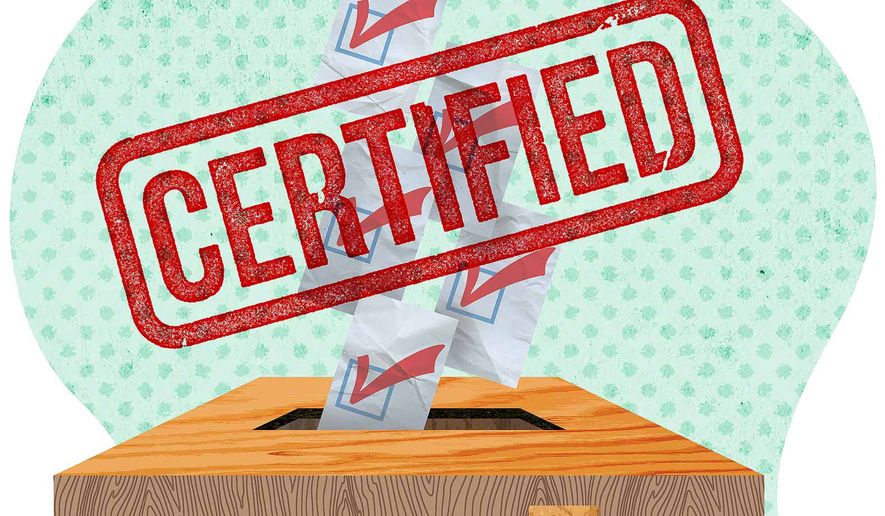OPINION:
So much for President Biden’s plan to take over elections. After more than a year of demanding that Congress sweep away state reforms promoting election integrity and force every state to adopt voting practices that could encourage fraud, the Senate on Wednesday blocked such legislation by refusing to kill the filibuster. It’s cause for celebration — and it should spur states to enact even stronger reforms.
The president’s failure is an opportunity for states. Many governors and lawmakers were likely waiting for the outcome of Wednesday’s vote, which could have unconstitutionally limited their power to enact their own election laws. Instead, they can now build on the foundation of the past year, during which 19 states took concrete steps to protect legal voting, prevent fraud and restore Americans’ faith in our electoral process.
They have done everything from passing voter ID laws to preventing private funding for public election administrations, yet there is still more work to do on a variety of fronts. Even the most pro-election integrity states, like Florida under Gov. Ron DeSantis, should act swiftly.
The opportunities in every state are different, given existing laws and recent reforms. Yet there are five key policies that most states should prioritize.
First, states must establish a comprehensive system to effectively enforce election laws. One solution is to create an Office of Election Security. While every state has election laws, no state has a reliable and properly resourced department dedicated solely to investigating election violations and prosecuting offenders. By establishing this office, states would better empower officials to protect voting rights, hold bad actors accountable and preserve the integrity of the ballot box. Enforcing election laws is inherently complex, and a dedicated agency would make it easier.
Second, states should ban ballot harvesting and adopt strong felony penalties that will effectively deter it. Ballot harvesting involves partisan third parties collecting and turning in huge numbers of ballots in support of their favored candidate — a system that has predictably led to fraud. Harvesters routinely prey upon vulnerable voters, including the elderly and people with disabilities, and offer unsolicited assistance filling out the ballots they collect. While many states already criminalize this practice, strengthening the penalties will give ballot harvesters second thoughts before breaking the law.
Third, states should prohibit government officials from distributing unsolicited absentee ballot applications and require voters to submit a new request for an absentee ballot every election. Currently, many states allow voters to submit an absentee ballot application for one election then receive absentee ballots for every election thereafter, regardless of whether they need it. Absentee ballots are less secure than in-person voting because they lack ID verification and can be filled out or mailed by third parties. Absentee ballot requests should be submitted for every election, not made the default voting option.
Fourth, states should prohibit unsecured drop boxes and require people returning ballots to drop boxes to show identification. That may require stationing election workers at drop-box locations, which Florida and Texas already do. Voter ID laws are increasingly widespread, yet without a drop-box ID requirement, there is an obvious loophole.
Fifth and finally, states should require that voter rolls be cleaned twice a year. Many states only conduct voter roll checks once every two years, yet people are constantly moving, passing away and losing the right to vote by committing crimes. With biannual checks, voter rolls are more likely to reflect the voting public, discouraging fraud.
Several of these policies, or similar versions, have already passed in some states. North Carolina, for instance, classifies ballot harvesting as a first-degree felony — a no-brainer given recent fraud in the state. Georgia recently required that drop boxes be kept under 24/7 surveillance. Texas banned officials from distributing unsolicited absentee ballot applications. Yet more must be done, in these states and in others.
Which state will lead the way? Florida is in the best position. In addition to passing a suite of election integrity reforms last year, Mr. DeSantis has also called on the state legislature to enact many of the policies listed above. He is right to do so, and the time to act is now, after Mr. Biden’s failure to nationalize elections and undermine election integrity nationwide. The death of his dangerous legislation in Congress shouldn’t be the end of the debate about protecting our democracy. It should be the start of a new phase — one in which states must take the lead.
• Madeline Malisa and Stewart Whitson are senior fellows at the Foundation for Government Accountability.




Please read our comment policy before commenting.